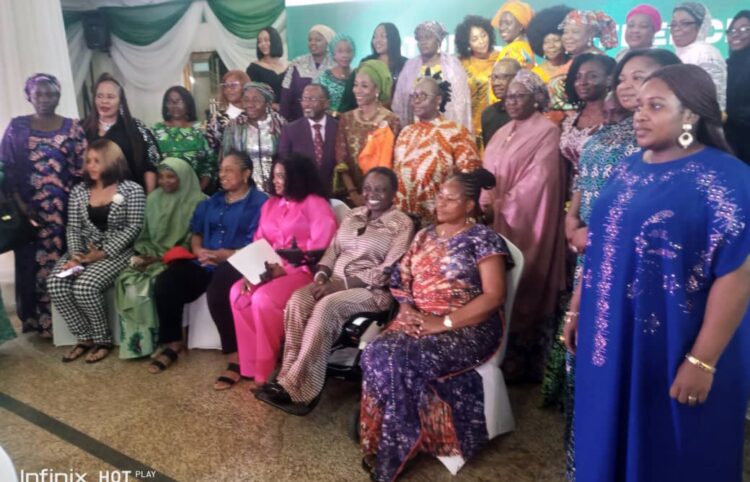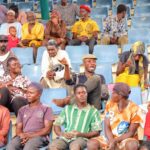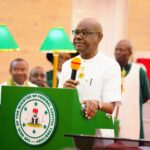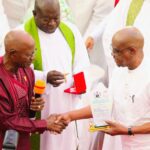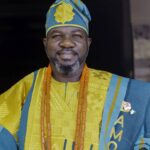By Angela Atabo
Stakeholders have called for a deliberate action towards increasing women’s participation in politics, through the reintroduction of gender bills.
The stakeholders made the call in Abuja, during a National Conference on women political participation in Nigeria.
the conference was organised by UN Women in collaboration with the Centre for Democracy and Development (CDD), the Women’s Political Participation Working Technical Group and Women in Politics Forum.
Ms Beatrice Eyong, UN Women Representative to Nigeria and ECOWAS, said the conference was crucial to assessing the 2023 General Elections.
Eyong, the lead convener of the event, said that goal was to identify areas of improvement and reinforce commitment to ensure equal participation and representation.
She said that women make up about half of Nigeria’s population, yet, remain underrepresented in politics.
She said that a data from the Independent Electoral Commission shows that women accounted for 47.5 per cent of the 93.5 million registered voters in the country.
According to her, only 10.1 per cent of the candidates fielded by political parties were female, while four per cent and five per cent were elected to the National and State Assemblies respectively.
“These statistics are a clear indication that there is still a long way to go in terms of gender equality in Nigerian politics.
“Our democracy is not truly representative unless it reflects the richness of perspective that both men and women bring to the table.
”So, we must delve into the root causes, social norms, cultural expectations and systemic barriers that limit the political agency of women.
“The role of political parties as vehicles to political power cannot be overstated. It is, therefore, essential for the parties to prioritise inclusion in their internal processes.
”Let us challenge parties to create an enabling environment and support qualified women.
“Nigeria is a signatory to the World Conference on Women in Beijing, which advocated 30 per cent affirmative action and the National Gender Policy recommends 35 per cent affirmative action.”
Eyong said UN Women made significant investments to the constitution review process and currently supporting the passage of the Gender and Equal Opportunities Bill, towards having a legal framework to increase women representations.
The Director, Centre for Democracy and Development (CDD), Ms Idayat Hassan, said that while there was a nominal increase in the number of women who dared to run during the 2023 elections, only a meager percentage made it.
Hassan, who was represented by Mr Chibuike Mgbeahuruike, Election Team Lead, CDD, said in spite of the tireless efforts of women candidates, the victories achieved remained disproportionately modest.
He said, “A disappointing outcome was the fact that only four women managed to secure seats to the senate exposing the glaring gaps in representation.
“The frustration lies not in the lack of capable and committed women leaders but in the systemic barriers that continue to obstruct their path to meaningful political influence .
“It is imperative to acknowledge and address the deep-rooted challenges women candidates confront like gender bias ,unequal funding and disproportionate levels of disinformation and misinformation.’’
Hassan said that the road to equality and representation in Nigerian politics remained marred by systemic roadblocks that demand immediate attention and rectification.
Ms Ebere Ifendu, Chair, Women Political Participation Working Group, said that the notion that women do not support women was a lie.
Ifendu said that women were highly marginalised from political parties’ level, adding that there was the need for legislations to compel parties to address that as well as the reintroduction of the gender bills.
She said that has a role to play by compelling political parties to improve women’s participation in political parties.
Ifendu called on women groups to speak with one voice and mentor younger women to climb the political ladder.
The Keynote Speaker, Ms Ene Obi, in her presentation titled `Gender Bias in Politics: An X-ray into the 2023 General Elections’, said that the political parties’ structures have continued to undermine women’s participation in politics.
She said, “In the 2023 elections, 1,019 women contested for elections and 48 of them were elected into parliament, this is a far cry from equal participation.
“We really need to rise in terms of deliberate positioning of women in governance.
“Although the National and some State Assemblies have women now ,however, states like Abia, Bauchi ,Borno, Gombe, Imo, Jigawa, Kano, Katsina, Kebbi, Niger, Osun, Rivers, Sokoto, Yobe and Zamfara are without women in their parliaments.
“Yet these assemblies will take decisions that concerns women forgetting that `nothing for us without us’.’’
Obi said that if federal character rule could be applied in appointments, it should as well be applied to elective positions.
Alhaji Yabagi Sani, National Chairman, Inter-Party Advisory Council (IPAC),reiterated the commitment of political parties to support women in politics.(NAN)
Edited by Bashir Rabe Mani




